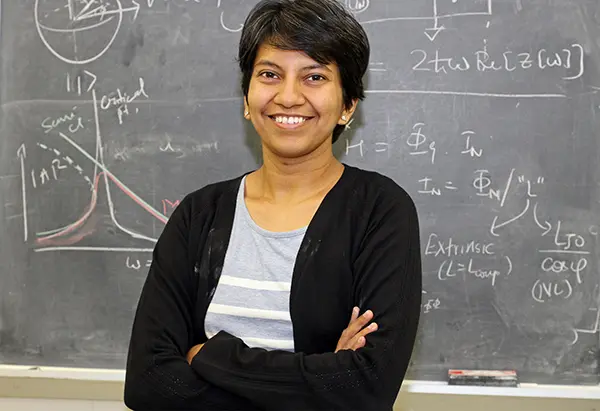Kamal Receives Early Career Awards from NSF, Air Force
 Image by Edwin Aguirre
Image by Edwin Aguirre
04/06/2021
Contacts for media: Christine Gillette, 978-934-2209 or Christine_Gillette@uml.edu and Nancy Cicco, 978-934-4944 or Nancy_Cicco@uml.edu
LOWELL, Mass. – UMass Lowell researcher Archana Kamal has won two early career development awards totaling more than $1 million from the U.S. Air Force and the National Science Foundation (NSF) for her research in the emerging field of quantum information processing (QIP) with open quantum systems.
QIP is based on the principles of quantum mechanics, which mathematically describe the behavior and interaction of matter and light on the atomic and subatomic scale.
While today’s digital computers encode data in the form of binary digits, or “bits,” which are a series of zeros and ones, quantum computers convert information into quantum bits, or “qubits.” A qubit, which is the basic unit of quantum information, represents a two-state, or two-level, quantum system, such as the up and down spin of an electron or the horizontal and vertical polarization of a photon.
Scientists worldwide, including Kamal, an assistant professor in UMass Lowell’s Department of Physics and Applied Physics, are developing next-generation quantum computing technologies with processors that can solve large, highly complex problems much faster than existing supercomputers using the best-known algorithms. This is the reason why for more than a decade, tech giants like Google, IBM and Microsoft have been investing heavily in quantum computer hardware research.
The biggest challenge to realizing usable quantum processors is “decoherence,” the loss and erasure of quantum information due to strong interactions between qubits and the uncontrolled, “noisy” environment around them. This is the central issue that Kamal is addressing in her research.
Aside from quantum computing, Kamal’s projects could lead to advances in QIP applications and other innovative technologies, including quantum sensing, quantum communication and quantum cryptography (using quantum mechanical properties to store and transmit data securely).
Kamal was recognized by the Air Force Office of Scientific Research with a Young Investigator Program grant – worth $450,000 over three years – for her work on tunable quantum dissipation, which can be used to develop autonomous, quantum error-correction protocols.
The grant is awarded to faculty researchers who “show exceptional ability and promise” in conducting creative, fundamental research in science and engineering, according to the Air Force.
“My project aims to develop self-correcting qubits using the new field of quantum reservoir engineering; that is, correcting quantum errors by controlling the environment seen by a quantum system instead of controlling the system directly,” said Kamal, who lives in Lowell.
She said this approach turns the table on decoherence by designing environments that preserve “quantumness” instead of destroying it.
“Specifically, the Air Force project will focus on extending this unique approach to large, multi-qubit networks, and realizing scalable error correction,” Kamal said.
Kamal’s five-year NSF CAREER grant totaling more than $557,000 will support her research into the entanglement dynamics of quantum systems in the presence of non-trivial noise.
The CAREER grant is the NSF’s “most prestigious award in support of early-career faculty who have the potential to serve as academic role models in research and education and to lead advances in the mission of their department or organization,” according to the agency.
Kamal’s project will explore how quantum reservoir engineering can be implemented for environments that retain “memory” of the quantum states of the system, or an environment that has a non-trivial quantum dynamic of its own that it can imprint to some degree on the system, causing the quantum system to be controlled in a way which was not possible if it were left alone.
“These aspects of autonomous quantum control are interesting and uncharted territory, both theoretically and experimentally,” said Kamal. “Our ultimate goal is to enable quantum technologies that can form the backbone of future quantum computers, which hold out the promise of offering unprecedented advantages over their classical (non-quantum) counterparts, and to answer fundamental questions in quantum physics in the process.”
The awards are the latest recognition for Kamal’s research. In 2018, she was named to MIT Technology Review’s prestigious annual list of Innovators Under 35 as a visionary. In September, Kamal was the co-presenter of a TEDx talk on the next quantum revolution as part of the TEDx “Breaking Barriers” webinar series. The series featured women experts speaking on a range of fields, from social justice and activism to space exploration, science, technology, education, business and medicine.
UMass Lowell is a national research university offering its more than 18,000 students bachelor’s, master’s and doctoral degrees in business, education, engineering, fine arts, health, humanities, sciences and social sciences. UMass Lowell delivers high-quality educational programs and personal attention from leading faculty and staff, all of which prepare graduates to be leaders in their communities and around the globe. www.uml.edu
